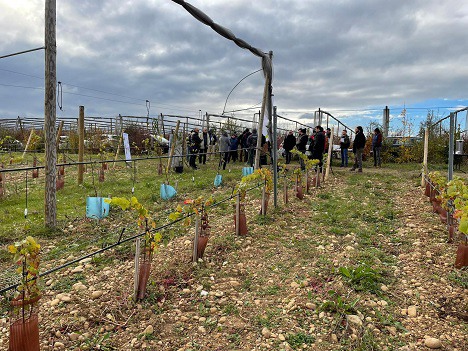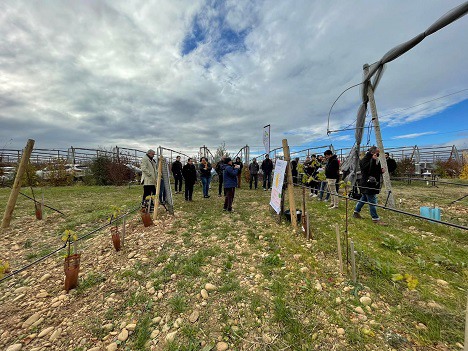In the Drôme department, an experimental vineyard was planted to meet the challenges of climate change and the issue of resource management in particular. The project called Vigne Climat’ic was launched in Etoile-sur-Rhône where wine-grapes and table-grapes are being studied on a half-hectare plot.
This is a full-scale test conducted at the request of producers worried about the future of the sector, especially in view of the increasing amount of weather hazards. Several issues were targeted by this experiment: extreme temperatures, reduction of water needs, protection against weather hazards such as hail, and reduction of phytosanitary products.
 © Chamber of Agriculture - Drôme
© Chamber of Agriculture - Drôme
“The goal of this experiment is to respond to several challenges, including the adaptation to climate change. On a plot of 0.5 hectare planted in 2021, we combined peaches, wine-grapes and table-grapes,” explains Mathilde Carra, agricultural engineer and advisor at the Chamber of Agriculture and head of the Vigne Climat’ic project.
Thanks to specific arrangements and the combination with other tree species, it is possible to reduce water consumption significantly, as well as the use of phytosanitary products. “This is a playground to experiment and go further than the producers can.”
 © Chamber of Agriculture - Drôme
© Chamber of Agriculture - Drôme
Fruit trees installed next to the vines. “One of the main challenges is to reduce the water needs of the vine. By providing shade indirectly, we limit the evapotranspiration process and irrigate only to meet the needs of the vine.”
Hedges were planted to fight frost and hail nets were also installed. A plant cover made of clovers and other green plants is also present on part of the plot to limit the use of fertilizers.
The first harvest should take place in the summer of 2023. It will help validate, or not, the tests conducted on this experimental plot.
For more information:
Vigne Climat'ic
Ferme expérimentale
2485 route des Pécollets
26800 Étoile-sur-Rhône
Phone: 04 75 82 40 00
chambres-agriculture.fr
